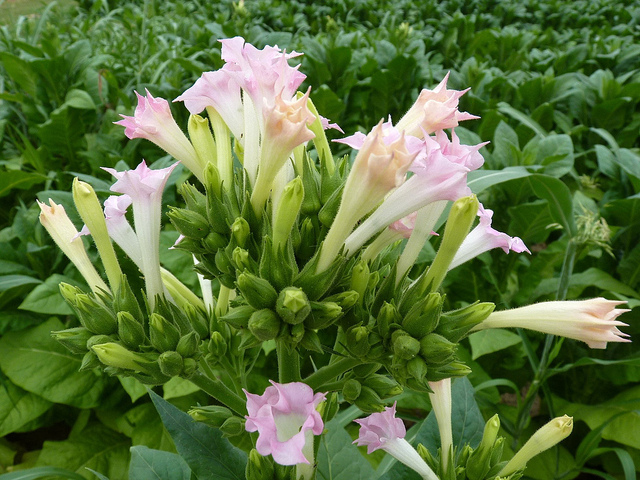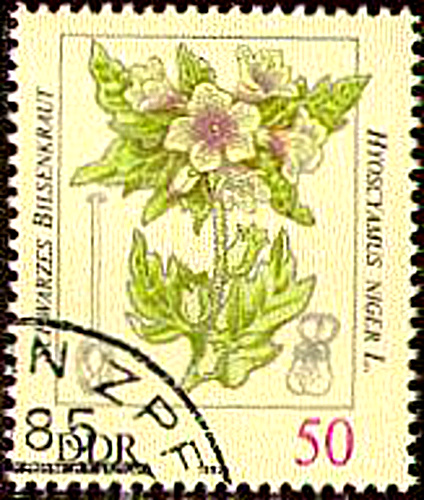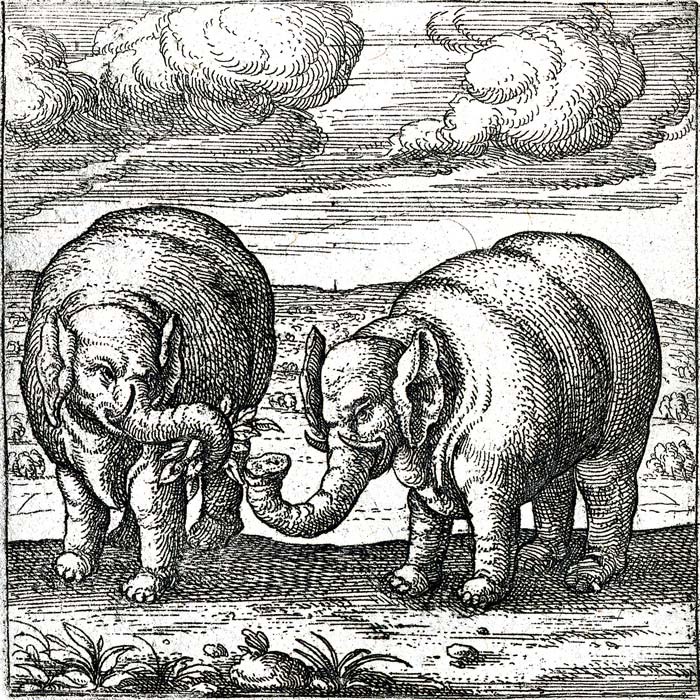It looks like you're using an Ad Blocker.
Please white-list or disable AboveTopSecret.com in your ad-blocking tool.
Thank you.
Some features of ATS will be disabled while you continue to use an ad-blocker.
share:
reply to post by Xoanon
What an absolutely brilliant thread. I'm quite sure the mods are giving you tons of applause for a well-constructed treatise on this remarkable species of plant.
I had no idea the potato and tomato were related to each other, let alone that they both are members of the storied nightshade family. Ah, the things we can learn on ATS!!
What an absolutely brilliant thread. I'm quite sure the mods are giving you tons of applause for a well-constructed treatise on this remarkable species of plant.
I had no idea the potato and tomato were related to each other, let alone that they both are members of the storied nightshade family. Ah, the things we can learn on ATS!!
Originally posted by Eidolon23
reply to post by Xoanon
One of my favorite pieces of plant folklore ever concerns the mandrake root and that most chaste of beasts, the elephant. In this illustration, we see an elephant offering a mandrake to its mate.
They are free of wicked desire for sex; when they wish to produce children, they go to the east near paradise, where a plant called mandrake grows. The female first takes some of the plant, then offers it to the male and persuades him to eat it. Becoming aroused from the action of the plant, they mate and the female immediately conceives. When it is time for her to give birth, for safety from their enemy the serpent (or the dragon) she enters a body of water up to her teats, and there gives birth, while the male stands guard on shore. The young elephant swims until it finds its mother's thighs and suckles from her teats.
...The female elephant seeks a plant called mandrake; when she tastes it she becomes aroused with lust. She offers the plant to the male, who also becomes aroused, and they mate.
spcoll.library.uvic.ca...
edit on 18-3-2012 by Eidolon23 because: (no reason given)
And now that is one of my favorite bits of mandrake lore ever, as well, Eidolon.
Thank you so much for this sweet and touching story. There is a giant world in those giant heads, I wish we lived in a world where we made understanding them a high priority.
That was an awesome bit of lore you shared.
X.
P.S. To All,
Here comes the tobacco entries. Thank you all for being here and for finding something in this thread that you have all enjoyed enough to stick around.
After the tobacco stuff, I would like to add a small slightly off-topic post about vedic astrology and why maybe some folks are attracted to certain types of plants and their applications.
X again.
edit on 18-3-2012 by Xoanon because:
reply to post by Xoanon
you left out cannabis. do you know how many things you can make with cannabis?
you left out cannabis. do you know how many things you can make with cannabis?
One important plant is missing but sadly can't be named on ATS.
With the amount of oxygen it produces, clothes, ropes and overall well being, I think it's one of the best plant on earth. It also has been around for a looooong time.
With the amount of oxygen it produces, clothes, ropes and overall well being, I think it's one of the best plant on earth. It also has been around for a looooong time.
Awesome thread! It is very informative.
I only recently knew about potatoes belonging to the same family as nightshade, and up until about a year ago I thought nightshade was a fictitious plant from videogames. Lots to learn from these posts for me.
I only recently knew about potatoes belonging to the same family as nightshade, and up until about a year ago I thought nightshade was a fictitious plant from videogames. Lots to learn from these posts for me.
edit on 18-3-2012 by smashdem because: (no reason given)
Tobacco. Nicotiana tabacum

Easily the most successful of these wonderful solanaceous plants is tobacco. I would like to now add that probably the height of success for a plant organism is to find itself someday carried around in the pockets of human beings. Imagine that? To have gone from the fields of North and South America, to world adventurer and traveler, amazing for a plant. Some of you have some of this member of family solanaceae within reach right now.
What is amazing is that this particular nightshade has none of the alkaloids that its cousins contain so famously. Tobacco carries its own famous chemical; nicotine. I am going to try very hard to stick to nicotine here but there are a couple of things we need to get out of the way.
Tobacco is old. really old. I know that all of us that are interested in piecing together our past struggle with time lines, or have stopped struggling and have adopted one. I am not going to get all persnippity about dates but there are some folks that say that 'baccy has been with us, in use, for 7000 years.
And we have been smoking it. And later we began to extract the essence of it; its sulphur or alchemical fire.

Tobacco has truly been our constant plant companion. Although some eschew its use, it cannot be denied, in some ways we are as close to it as our pets, in the ways that we cultivate and care for it. This is the meaning of success for a plant. Imagine the places it has been with us, and imagine where it will go.
One of the things that I wanted to share with you on this trip to the solanaceous garden, is my fascination with the fact that Family Solanaceae is poisonous, yet we reach for it for so many uses. Why?
I will say it simply; because some poisons are good for us. And nicotine, and the tropane alkaloids produced by its cousins, when used wisely, are good for us. We reach for them because they are our helpful companions on this journey through space. that is why they are successful and that is why we are and will continue to be successful.
Yes. We will see Family Solanaceae in space, if we have not already.
Tobacco nearly in space. Especially the 2 guys on the left.

Nicotine and your brain.
I am sorely tempted to just cut and paste all of this, but I will try to paraphrase and I hope that you will all go to the article and read it. It is very well written, easy to understand, and makes clear the actions of nicotine in the brain.
Your brain works because there is a system of nerve cells that all communicate with one another as a network. The grease that makes the magic happen in there are called neurotransmitters. These allow the nerve cell networks to work in a sort of binary fashion, they are either on or off, receiving or not receiving. The main grease that allows this to all work is called acetycholine, the more there is, the more the network is able to pass along information and the more the network will be "on".
Nicotine works like acetylcholine, in fact it is the only drug outside of our bodies that does. Let that sink in.
I'll wait.
OK.
There are other uses that we put nicotine to in medicine and elsewhere. I would like to get to them as we go along. In the meantime, I hope that gets the discussion rolling on tobacco and its active ingredient, nicotine.
I would also, as promised, like to get to a small bit on solanaceous food plants and arthritis, the short of it is that those with arthritis may wish to re-evaluate how much of these foods they are eating and they may want to cut down so as not to exacerbate the inflammation.
Thank you all for being here.
X.

Easily the most successful of these wonderful solanaceous plants is tobacco. I would like to now add that probably the height of success for a plant organism is to find itself someday carried around in the pockets of human beings. Imagine that? To have gone from the fields of North and South America, to world adventurer and traveler, amazing for a plant. Some of you have some of this member of family solanaceae within reach right now.
What is amazing is that this particular nightshade has none of the alkaloids that its cousins contain so famously. Tobacco carries its own famous chemical; nicotine. I am going to try very hard to stick to nicotine here but there are a couple of things we need to get out of the way.
Tobacco is old. really old. I know that all of us that are interested in piecing together our past struggle with time lines, or have stopped struggling and have adopted one. I am not going to get all persnippity about dates but there are some folks that say that 'baccy has been with us, in use, for 7000 years.
And we have been smoking it. And later we began to extract the essence of it; its sulphur or alchemical fire.

Tobacco has truly been our constant plant companion. Although some eschew its use, it cannot be denied, in some ways we are as close to it as our pets, in the ways that we cultivate and care for it. This is the meaning of success for a plant. Imagine the places it has been with us, and imagine where it will go.
One of the things that I wanted to share with you on this trip to the solanaceous garden, is my fascination with the fact that Family Solanaceae is poisonous, yet we reach for it for so many uses. Why?
I will say it simply; because some poisons are good for us. And nicotine, and the tropane alkaloids produced by its cousins, when used wisely, are good for us. We reach for them because they are our helpful companions on this journey through space. that is why they are successful and that is why we are and will continue to be successful.
Yes. We will see Family Solanaceae in space, if we have not already.
Tobacco nearly in space. Especially the 2 guys on the left.

Nicotine and your brain.
I am sorely tempted to just cut and paste all of this, but I will try to paraphrase and I hope that you will all go to the article and read it. It is very well written, easy to understand, and makes clear the actions of nicotine in the brain.
Your brain works because there is a system of nerve cells that all communicate with one another as a network. The grease that makes the magic happen in there are called neurotransmitters. These allow the nerve cell networks to work in a sort of binary fashion, they are either on or off, receiving or not receiving. The main grease that allows this to all work is called acetycholine, the more there is, the more the network is able to pass along information and the more the network will be "on".
Nicotine works like acetylcholine, in fact it is the only drug outside of our bodies that does. Let that sink in.
I'll wait.
OK.
This stimulation leads to:
-Increased release of acetylcholine from the neurons, leading to heightened activity in cholinergic pathways throughout your brain. This cholinergic activity calls your body and brain to action, and this is the wake-up call that many smokers use to re-energize themselves throughout the day. Through these pathways, nicotine improves your reaction time and your ability to pay attention, making you feel like you can work better.
-Release of glutamate, a neurotransmitter involved in learning and memory - Glutamate enhances the connections between sets of neurons. These stronger connections may be the physical basis of what we know as memory. When you use nicotine, glutamate may create a memory loop of the good feelings you get and further drive the desire to use nicotine.
-Nicotine also increases the level of other neurotransmitters and chemicals that modulate how your brain works. For example, your brain makes more endorphins in response to nicotine. Endorphins are small proteins that are often called the body's natural pain killer.
science.howstuffworks.com...
There are other uses that we put nicotine to in medicine and elsewhere. I would like to get to them as we go along. In the meantime, I hope that gets the discussion rolling on tobacco and its active ingredient, nicotine.
I would also, as promised, like to get to a small bit on solanaceous food plants and arthritis, the short of it is that those with arthritis may wish to re-evaluate how much of these foods they are eating and they may want to cut down so as not to exacerbate the inflammation.
Thank you all for being here.
X.
edit on 18-3-2012 by Xoanon because: .
Narcissous, User8911.
This thread is solely about Family Solanaceae
Cannabis is not within that family of plants. At all.
The only connection that can be made whatsoever, aside from anthropological similarities, is that C. is susceptible to a virus that is found in tobacco called tobacco mosaic.
I appreciate your interest and I hope that you find Family Solanaceae interesting enough to satiate your appetite for plant lore.
Consider that we have been allowed to have this discussion so far with no issues concerning Terms and Conditions.
That being said, let this be the final word on C. on this thread.
Thank you.
X.
This thread is solely about Family Solanaceae
Cannabis is not within that family of plants. At all.
The only connection that can be made whatsoever, aside from anthropological similarities, is that C. is susceptible to a virus that is found in tobacco called tobacco mosaic.
I appreciate your interest and I hope that you find Family Solanaceae interesting enough to satiate your appetite for plant lore.
Consider that we have been allowed to have this discussion so far with no issues concerning Terms and Conditions.
That being said, let this be the final word on C. on this thread.
Thank you.
X.
edit on 18-3-2012 by Xoanon because: .
All of these plants respond very well to deepwater culture hydroponics. You can grow about 30 pounds of tomatoes from a single plant in a 5 gallon
bucket with a small basket, lava rocks, and hydroponic fertilizer solution bubbled with a fish tank air pump!
Originally posted by eywadevotee
All of these plants respond very well to deepwater culture hydroponics. You can grow about 30 pounds of tomatoes from a single plant in a 5 gallon bucket with a small basket, lava rocks, and hydroponic fertilizer solution bubbled with a fish tank air pump!
Yes, exactly. They are so eager to please and adapt and thrive. I think that must be why we get excited when we see them, like mutually recognized friends on a shared journey. They can't wait to get in our bellies.
X.
reply to post by Xoanon
I had solanum nigrum (I think) growing in my back yard...but since I wasn't sure, I wasn't going to risk trying the berries.
Isn't tobacco in the family as well? ...and Wikipedia says yes.
I had forgotten that angel's trumpet was in the family. They're very popular landscaping plants here in Florida. My friend who grew up in Mexico said his mom visited him from SoCal and noticed his Angel's trumpet right away...making jokes about shamanistic trips and what not. I know what we're not supposed to discuss here, so suffice it to say I also was a little to scared to attempt that as well (I read the personal experiences on that erowid website...not what I was looking for).
As far as food goes, this family is my favorite...especially the capsicum
I had solanum nigrum (I think) growing in my back yard...but since I wasn't sure, I wasn't going to risk trying the berries.
Isn't tobacco in the family as well? ...and Wikipedia says yes.
I had forgotten that angel's trumpet was in the family. They're very popular landscaping plants here in Florida. My friend who grew up in Mexico said his mom visited him from SoCal and noticed his Angel's trumpet right away...making jokes about shamanistic trips and what not. I know what we're not supposed to discuss here, so suffice it to say I also was a little to scared to attempt that as well (I read the personal experiences on that erowid website...not what I was looking for).
As far as food goes, this family is my favorite...especially the capsicum
reply to post by Xoanon
I don't normally notice threads like this. However, I've enjoyed reading this one.
Kudos on an excellent thread with information that should be more widespread in our culture.
I don't normally notice threads like this. However, I've enjoyed reading this one.
Kudos on an excellent thread with information that should be more widespread in our culture.
Just my $.02 that I also have enjoyed this thread. It's such a pleasure to actually learn stuff and read about real world topics with actual
relevance and application. I intend to stay tuned. I imagine this thread will be one of those that grows slowly, but stays around forever. Thanks.
What a brilliant thread. Star and Flag.
Really interested with your next posts about nicotine. I am relatively new to the study of neurotransmitters, so am really looking forward to the rest.
Thank you.
Really interested with your next posts about nicotine. I am relatively new to the study of neurotransmitters, so am really looking forward to the rest.
Thank you.
Originally posted by Xoanon
Narcissous, User8911.
This thread is solely about Family Solanaceae
Cannabis is not within that family of plants. At all.
Ahhhh I see
I have heard about positive aspect of nicotine a couple times.
Although I agree with the benefits, I think that most are more than canceled due to the inability to think optimally when in need of nicotine. The addiction from it is down right scary, so are the health hazards due to constant smoking especially with all the bad ingredients added to the tobacco.
However, I don't feel like pure tobacco, if smoked occasionally, is really a strong health concern
edit on 18-3-2012 by User8911 because: (no
reason given)
reply to post by Xoanon

I hope I am not anticipating you here, but I have found out something very interesting about the probable origins of the North American sacred tradition surrounding tobacco. Apparently, Black Henbane was used in the paleolithic era as a sacrament. It's possible that when folks took the land bridge trek over from Asia, they swapped in the native Nicotiana for the henbane they lacked in the New World.
Also, the name of the Czech town Pilsner is derived from the German word for Henbane, "Bilsner". That is because the eponymous beer was originally brewed with Henbane. I guess there are still a couple of breweries that offer an old school draft of Bilsnerkraut, but I'll stick to Pilsner Urquell. .
More on henbane here, and a great site overall.
www.entheology.org...

I hope I am not anticipating you here, but I have found out something very interesting about the probable origins of the North American sacred tradition surrounding tobacco. Apparently, Black Henbane was used in the paleolithic era as a sacrament. It's possible that when folks took the land bridge trek over from Asia, they swapped in the native Nicotiana for the henbane they lacked in the New World.
Also, the name of the Czech town Pilsner is derived from the German word for Henbane, "Bilsner". That is because the eponymous beer was originally brewed with Henbane. I guess there are still a couple of breweries that offer an old school draft of Bilsnerkraut, but I'll stick to Pilsner Urquell. .
More on henbane here, and a great site overall.
www.entheology.org...
Excellent thread. We need more of these types of threads around here. Well written, informative...and no room for anyone to equate R.Paul as the
second coming of Christ. Star and flag, great job.
reply to post by Eidolon23
Thank you a million times thank you. I never would have thought to seek out something like this. I am totally sold, just based on what you posted there. It makes complete sense to me. I bet those folks from Asia appreciated the nicotiana a lot more than being regularly besotten with drooling paralysis, but who knows.
Hmmmm? Berserker Brew? The stuff, prepared properly, is supposed to also be an aphrodisiac and deliriant.
Thank you again, these two nuggets really do make ya think, don't they?
There is just something irresistible about all things bitter to certain adult palates. Like the xanthenes found in Coffee and Mate, it is said that the bitter taste is actually anticipated by our tongues and sends a signal to the brain to ready it for xanthene goodness (caffeine). They are poisonous in high doses as well. There is something in us that wants these poisons and, I think, balances our presence in the world with them.
Please keep it coming. I will get more up about nicotine and the arthritis information too.
You are awesome, as always.
X.
I hope I am not anticipating you here, but I have found out something very interesting about the probable origins of the North American sacred tradition surrounding tobacco. Apparently, Black Henbane was used in the paleolithic era as a sacrament. It's possible that when folks took the land bridge trek over from Asia, they swapped in the native Nicotiana for the henbane they lacked in the New World.
Thank you a million times thank you. I never would have thought to seek out something like this. I am totally sold, just based on what you posted there. It makes complete sense to me. I bet those folks from Asia appreciated the nicotiana a lot more than being regularly besotten with drooling paralysis, but who knows.
Also, the name of the Czech town Pilsner is derived from the German word for Henbane, "Bilsner". That is because the eponymous beer was originally brewed with Henbane. I guess there are still a couple of breweries that offer an old school draft of Bilsnerkraut, but I'll stick to Pilsner Urquell. .
Hmmmm? Berserker Brew? The stuff, prepared properly, is supposed to also be an aphrodisiac and deliriant.
Thank you again, these two nuggets really do make ya think, don't they?
There is just something irresistible about all things bitter to certain adult palates. Like the xanthenes found in Coffee and Mate, it is said that the bitter taste is actually anticipated by our tongues and sends a signal to the brain to ready it for xanthene goodness (caffeine). They are poisonous in high doses as well. There is something in us that wants these poisons and, I think, balances our presence in the world with them.
Please keep it coming. I will get more up about nicotine and the arthritis information too.
You are awesome, as always.
X.
edit on 18-3-2012 by Xoanon because: .
Arthritis Sufferers
Although there is no definitive proof that foods from the nightshade family cause arthritis, it may be prudent for those that have real issues with arthritis to consider reducing or experimentally removing solanaceous food plants from their diet.
I will link you to the 1993 study that I am referring to and I will post a bit of the abstract. This is not to alarm anyone, it is just food for thought for those that have arthritis pain, sometimes one's diet is overlooked and I hope that the information is found to be useful...
Please keep in mind that this was published by the Nightshade Arthritis Research Foundation and published in The Journal of Neurological and Orthopedic Medical Surgery in 1993. The NARF caught a lot of hell for saying that nightshade food plants could be the source of arthritis, but when all is said and done, the operative word is sensitive people, there are always going to be folks that react more strongly to certain toxins and irritants than others, so this is still good to know...
There we go.
Now on to more tobacco lore, and let's do some more Witchcraft too.
X.
Although there is no definitive proof that foods from the nightshade family cause arthritis, it may be prudent for those that have real issues with arthritis to consider reducing or experimentally removing solanaceous food plants from their diet.
I will link you to the 1993 study that I am referring to and I will post a bit of the abstract. This is not to alarm anyone, it is just food for thought for those that have arthritis pain, sometimes one's diet is overlooked and I hope that the information is found to be useful...
Please keep in mind that this was published by the Nightshade Arthritis Research Foundation and published in The Journal of Neurological and Orthopedic Medical Surgery in 1993. The NARF caught a lot of hell for saying that nightshade food plants could be the source of arthritis, but when all is said and done, the operative word is sensitive people, there are always going to be folks that react more strongly to certain toxins and irritants than others, so this is still good to know...
Previous studies [1] have established the relation of arthritis to a family of food plants and tobacco, the Solanaceae, or nightshades. This study is based on surveys of over a thousand volunteers who omitted from daily usage these crops and their culprit chemicals in other foods.
noarthritis.com...
There we go.
Now on to more tobacco lore, and let's do some more Witchcraft too.
X.
edit on 18-3-2012 by Xoanon because: .
What a great post! I think you should write a book. You have a great writing style.
Thanks for enlightening me this evening!
Thanks for enlightening me this evening!
reply to post by Xoanon
The Gooseberries and Huckleberries don't belong here.
en.wikipedia.org...
en.wikipedia.org...
The Gooseberries and Huckleberries don't belong here.
Gooseberries and Huckleberries: Dessert!
en.wikipedia.org...
en.wikipedia.org...
The 'garden huckleberry' (Solanum melanocerasum) is not considered to be a true huckleberry but is instead a member of the nightshade family.
new topics
-
'Mass Casualty event' - Attack at Christmas market in Germany
Mainstream News: 1 hours ago -
Search to Resume for MH 370
Disaster Conspiracies: 4 hours ago -
Sue Gray, Sir Keir Starmer's former Chief of Staff, Nominated for Peerage
Regional Politics: 5 hours ago -
Biden Nationalizes Another 50,000+ Student Loans as He Heads for the Exit
US Political Madness: 6 hours ago
top topics
-
'Mass Casualty event' - Attack at Christmas market in Germany
Mainstream News: 1 hours ago, 19 flags -
An Interesting Conversation with ChatGPT
Science & Technology: 15 hours ago, 8 flags -
Biden Nationalizes Another 50,000+ Student Loans as He Heads for the Exit
US Political Madness: 6 hours ago, 7 flags -
Search to Resume for MH 370
Disaster Conspiracies: 4 hours ago, 4 flags -
Sue Gray, Sir Keir Starmer's former Chief of Staff, Nominated for Peerage
Regional Politics: 5 hours ago, 3 flags
active topics
-
'Mass Casualty event' - Attack at Christmas market in Germany
Mainstream News • 20 • : SteamyAmerican -
Squirrels becoming predators
Fragile Earth • 34 • : NorthOS -
Can someone 'splain me like I'm 5. Blockchain?
Science & Technology • 90 • : Ravenwatcher -
Russias War Against Religion in Ukraine
World War Three • 54 • : andy06shake -
Search to Resume for MH 370
Disaster Conspiracies • 3 • : chr0naut -
Drone Shooting Arrest - Walmart Involved
Mainstream News • 36 • : imitator -
-@TH3WH17ERABB17- -Q- ---TIME TO SHOW THE WORLD--- -Part- --44--
Dissecting Disinformation • 3768 • : Thoughtful3 -
Have you noticed?? Post Election news coverage...
World War Three • 10 • : chr0naut -
An Interesting Conversation with ChatGPT
Science & Technology • 21 • : Flyingclaydisk -
US Federal Funding set to Expire December 20th. Massive CR on the way.
Mainstream News • 45 • : marg6043

